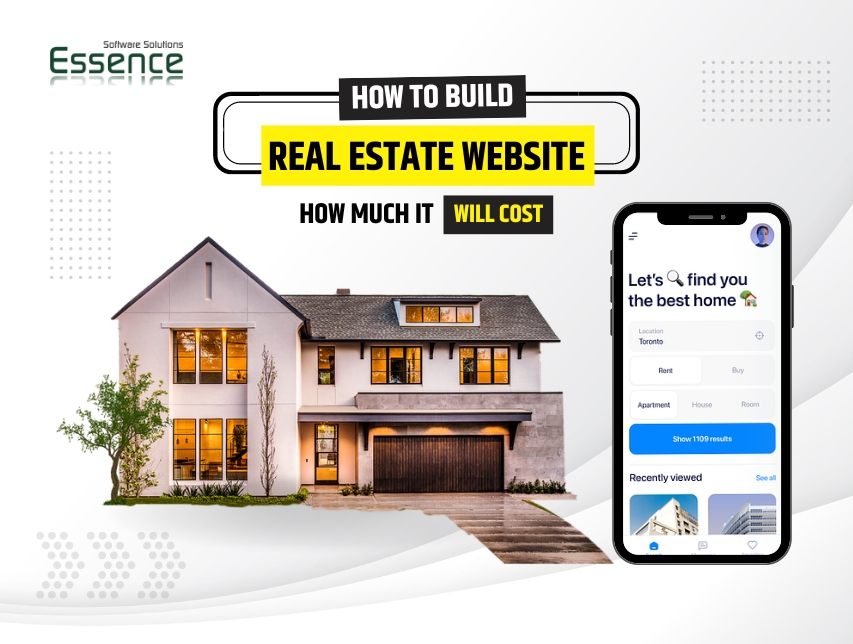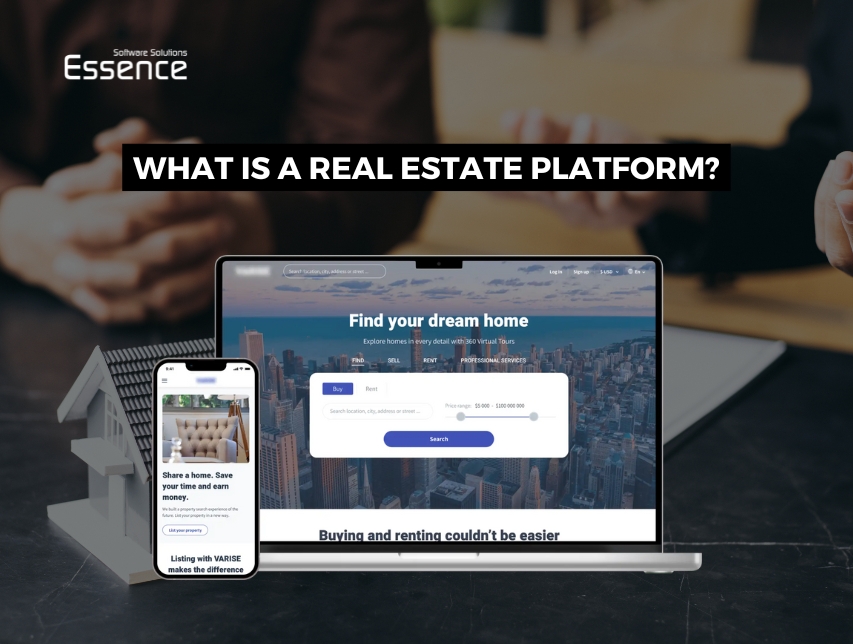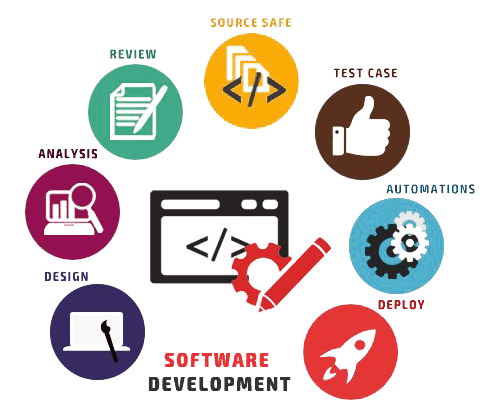
HOW TO BUILD A REAL ESTATE WEBSITE AND HOW MUCH IT WILL COST
A good online presence is crucial for any real estate business in the modern digital era.
If you’re a developer or business owner lookinIn addition to bringing in new customers, a well-designed and user-friendly website may speed up your business processes and improve the perception of your brand. g to create an app in 2023, you’re faced with a tough decision: Native, Hybrid, or Cross-Platform.
A real estate website needs to have a number of essential components, such as an easy-to-use property search engine, listings of available properties, agent profiles, and a visually appealing layout that captures your corporate identity.
This article will show you how to build a successful website and details the costs involved, whether you are a real estate office or an independent broker.
In the following sections, we will go into each component of creating a real estate website, giving you practical tips, types of real estate websites, and how to build a real estate website in 6 steps.
Lastly, we’ll get to know 3 features your real estate platform must have that help you make informed decisions and establish a successful online platform that stands out in the competitive real estate market.
What Is A Real Estate Platform?

In order to organize and conduct many elements of their real estate business online, real estate professionals, such as agents, brokers, property developers, and investors, use a real estate platform. It functions as a central hub for real estate listings, transactions, communication, and cooperation between various industry stakeholders.
A wide range of features and functionalities intended to improve and streamline various real estate operations are often offered by real estate platforms.
These qualities could consist of:
- Listings and Search for Properties
- Lead Generation and Management
- Analytics and Reporting
- Transaction Management
- Communication and Collaboration
- Analytics and Reporting
Why invest in creating a real estate website?

Basically, if you are making a strategic investment in the development of a real estate website it can completely change how you conduct business.
Having an attractive and useful website is now crucial given that more and more potential customers use the internet to look for properties and contact real estate agents.
A real estate website acts as an internet shop and provides a number of advantages that can strengthen your brand, broaden your audience, and improve your business processes.
Here are some primary reasons in favor of doing so:
Expanded Online Presence: In the modern digital environment, reaching a larger audience requires a strong online presence. A well-designed real estate website functions as a round-the-clock online storefront, letting potential customers learn about your offerings and homes whenever they choose, from any location.
Enhanced Credibility and Branding: Having a polished, user-friendly website helps you establish more credibility and a stronger brand identity. It highlights your experience, highlights your listings, and gives visitors useful information.
Effective property showcase: An efficient property showcase is provided by your website, which acts as a detailed digital gallery of your properties. You can upload crisp pictures, virtual tours, floor plans, and in-depth descriptions of the property. This saves you and your clients time and effort by enabling potential clients to browse properties remotely.
Types Of Real Estate Websites
There are several kinds of real estate websites, each serving a different purpose within the real estate market. These websites provide digital platforms for interaction, information access, and business transactions between real estate professionals, buyers, sellers, investors, and renters. Following are some popular categories of real estate websites:
Property Listing Portals
Real estate listings are gathered by property listing websites from a variety of sources, including brokers, agents, developers, and homeowners. They offer a centralized platform where customers can look up, browse, and investigate a variety of houses for sale or rent. To assist customers in finding homes that meet their particular criteria, these portals frequently provide advanced search and filtering capabilities.
Real Estate Agency Websites
Websites for real estate agencies are devoted to showcasing the offerings, listings, and qualifications of a particular real estate agency or brokerage. They act as the agency’s digital representation and feature real estate listings from their own inventory. These websites frequently provide details about the agency’s staff, services provided, and contact information.
Realtor/Agent Websites
Websites for realtors and agents are individualized online spaces for specific real estate experts. These websites concentrate on advertising the agent’s reputation, area of specialization, and listings. They frequently provide agent biographies, client endorsements, and contact information, enabling site users to get in touch with the agency directly. Additionally, lead creation and client management tools may be available on agent websites.
Real Estate Marketplace Platforms
These platforms serve as online markets by establishing direct connections between buyers, sellers, and tenants. By enabling users to list properties, arrange deals, and communicate with one another, these platforms facilitate transactions. Examples of real estate marketplace systems include Redfin for buying and selling residential homes as well as Airbnb for short-term rentals.
Real Estate Investment Websites
These websites are specifically designed for investors looking for Real Estate Investment options. These websites offer resources, tools, and information about real estate investments. To help investors make wise selections, they might provide analytics, market trends, investing calculators, and educational content.
Property Management Websites
Websites for property management are created for firms that handle many properties or for individual property owners. These websites provide solutions like tenant portals, rent collection, maintenance request forms, and accounting systems to simplify property management procedures. Websites for property management assist landlords in effectively managing their properties and interacting with tenants.
How To Build A Real Estate Website In 6 Steps
The process of creating a real estate website might be difficult, but by following these six steps, you can provide a strong foundation for your website:
Specify Your Goals and Conditions: Establishing your website’s goals should be your first step. Choose whether the website’s main function is to showcase real estate listings, generate leads, or offer informational resources. Make a list of the exact features and functions you need, such as mortgage calculators, contact forms, agent profiles, and property searches.
Select a Website Platform: Decide on a website platform that is compatible with your objectives and level of technical knowledge. Popular options for real estate websites include content management systems (CMS) like WordPress, Joomla, or Drupal, which provide flexibility, customizability possibilities, and a large selection of plugins and themes.
Design and Layout: Create an appealing and user-friendly design for your website. Choose a responsive theme or collaborate with a professional web designer to build a bespoke design that reflects your brand and fulfills the expectations of your target audience. Consider the layout, navigation, color palette, and typography to create a visually appealing and intuitive user experience.
Create Essential elements: Include key elements that are required for a real estate website. This may include property listing management, search filters, property details pages, image galleries, virtual tours, contact forms, lead capture tools, and connectivity with a customer relationship management (CRM) system. To incorporate these capabilities into your website, use plugins, widgets, or bespoke programming.
Content Creation: Create high-quality content for your website. Create appealing property descriptions, upload quality property images, and incorporate virtual tours or videos if possible. Create insightful blog entries about real estate, market trends, and buyer or seller tips. Improve search engine visibility by optimizing your content with relevant keywords.
Launch and Promote Your Website: Once your website is complete, it should be launched and promoted through numerous means. Optimize your website for search engines by implementing on-page SEO techniques, use social media platforms to reach a larger audience, and explore digital marketing strategies such as pay-per-click advertising or email marketing campaigns to drive traffic to your website.
3 Features Your Real Estate Platform Must Have
There are some crucial things to consider while developing a real estate platform to ensure its effectiveness and user-friendliness. Here are three essential characteristics of your real estate platform:
Property Search and Filtering: Any real estate platform must have a strong property search and filtering mechanism. Users should be able to search for properties by location, price range, property type, number of bedrooms, and amenities. Users can narrow their search results and identify properties that match their individual needs by using advanced filtering options. The search results should include thorough information about each property, such as descriptions, photographs, virtual tours, and contact information for more questions.
User Accounts and Profiles: Creating a personalized experience on your real estate platform requires the use of user accounts and profiles. Users should be able to create accounts, store favorites, set up property notifications, and view their search history. User profiles can also be used to manage personal information, communication preferences, and previous contacts with agents or properties. User accounts and profiles increase user engagement and give a consistent experience for repeat users.
Communication and Inquiry Tools: Your real estate platform should make it simple and easy for users to communicate with real estate experts. Implement message or chat features to allow users and agents to communicate directly, allowing them to ask inquiries, request property viewings, and negotiate transactions. Additionally, make inquiry forms or contact information available for users to express their interest in specific properties or request additional information. Quick and dependable communication tools promote user happiness and the likelihood of successful transactions.
How Can We Help With Creating Real Estate Websites (including our name Essence in this)

Essence Solutions specializes in developing amazing real estate websites that are customized to your individual requirements. Our professional web developers and designers are committed to assisting you in developing a strong online presence in the real estate industry. As a best web development company in India, Here’s how we can help you create your dream real estate website:
- Custom Web Design: We recognize the significance of a visually appealing and user-friendly design. Our professionals will collaborate with you to build a custom website design that is consistent with your brand identity and appeals to your target audience.
Mobile Optimization: With the rising use of mobile devices, having a mobile-responsive website is critical. Our experts will guarantee that your real estate website is optimized for several screen sizes and devices, allowing users on smartphones, tablets, and computers to browse with ease.
Ongoing Support and Maintenance: Building a real estate website is an ongoing process that requires continuous support and maintenance. To keep your website functioning properly, we provide extensive support and maintenance services.
Conclusion
In conclusion, developing a real estate website is an essential step towards having a solid online presence in the competitive real estate sector.
A well-designed and feature-rich website can dramatically improve your exposure, attract potential clients, and streamline property transactions, whether you’re a real estate agency, a property developer, or an individual realtor.
You can create a seamless and personalized user experience by including crucial elements such as property search and filtering, user accounts and profiles, and practical communication tools.









